Looking After Your Health This Winter: Do You Need To See A GP?
Caring for Your Child’s Cough: What Every Parent Should Know
As a parent, you’re the expert when it comes to your child’s health. Coughs are common, especially in young children, and often they’re nothing serious. But knowing when to manage things at home and when to get help is key — and we’re here to support you every step of the way.
Why Does My Child Cough?
Coughing is your child’s way of clearing their airways. It’s usually caused by:
-
Common colds or other viruses
-
Allergies
-
Some infections
Most coughs improve on their own within a couple of weeks.
‘Noisy chests’ or ‘chesty coughs’ are quite common when young children catch a cold and are not necessarily a sign of a ‘chest infection’.
When Should You Contact Us?
Knowing when to seek medical advice can be tricky, so here’s a simple guide to help you decide.
Please contact your GP or seek urgent medical help if your child has any of these signs:
| Warning Signs — Contact Us Immediately |
|---|
| Your child is struggling to breathe or breathing very fast |
| Chest pain or persistent discomfort |
| A high fever that doesn’t improve with medication |
| Cough lasting more than 3 weeks |
| Coughing up blood |
| Signs of dehydration (very dry mouth, very little urine) |
| Your child is under 3 months old with a cough and fever |
| Your child wakes only with lots of stimulation, or is much less responsive to social stimulation |
| Your childs skin is paler than usual |
| Your child under 1 years old stops feeding entirely. |
If skin, lips or tongue appear blue, call 999.
If you notice any of these, don’t hesitate to get in touch or seek emergency care.
How Long Should a Cough Last?
Most coughs will clear up naturally within 3-4 weeks.
If your child’s cough is lasting longer than these times, please give us a call.
Taking Care at Home
Most coughs are caused by viruses and don’t need antibiotics. Instead, focus on:
-
Keeping your child comfortable and well hydrated
-
Using fever relief medicines like paracetamol or ibuprofen if needed
-
Watching closely for any worsening symptoms
Remember, antibiotics aren’t always the answer and can sometimes cause harm if used unnecessarily.
We’re Here to Support You
You know your child best — and with these guidelines, you can feel confident about caring for their cough at home while knowing when to seek help.
For more detailed information, here’s the full RCGP poster:
Download the Caring for Children with Cough Poster (PDF)
Looking after your child’s health is a big job — but you’re not alone. We’re here to help whenever you need us.
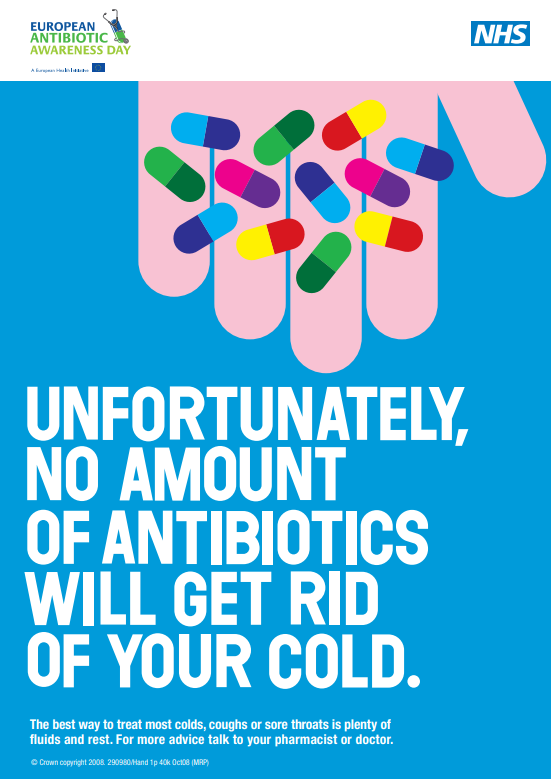
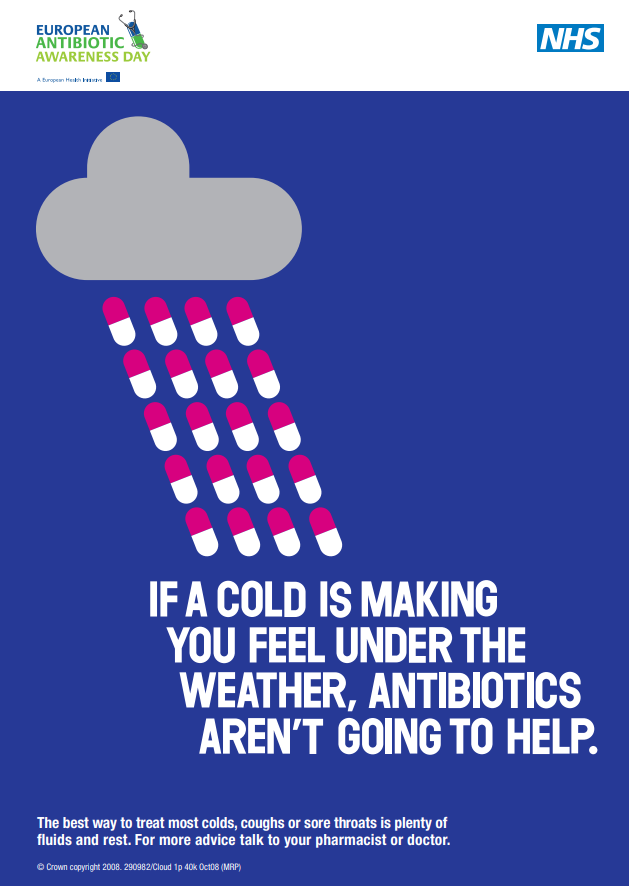
Published on 21st Aug 2025
Feeling Under the Weather? Here's What You Need to Know About Colds, Coughs & Antibiotics
As the colder months roll in, it’s normal to come down with sniffles, sore throats, coughs, or earaches. When you’re not feeling your best, it’s understandable to want a quick fix—but antibiotics aren’t always the answer.
Here’s what you need to know about common infections, how long they usually last, and when to seek help from your GP.
💊 Do I Need Antibiotics?
In most cases, no.
Antibiotics only work for bacterial infections—not for viruses, which cause most seasonal illnesses like:
-
Colds
-
Coughs
-
Sore throats
-
Most earaches
Taking antibiotics when you don’t need them won’t make you better—and can actually do harm by increasing antibiotic resistance, meaning they might not work when you really need them.
🕒 How Long Will My Infection Last?
These illnesses often get better on their own with rest, fluids, and a bit of patience. Here's a guide based on information from the UK Health Security Agency (UKHSA):
| Common Infection | How Long It Usually Lasts |
|---|---|
| 👂 Earache | Around 7–8 days |
| 😷 Sore throat | Around 7–8 days |
| 🤧 Cold | Up to 14 days |
| 🗣️ Cough | Up to 3–4 weeks |
| 🤢 Norovirus (sickness bug) | 2–3 days |
| 🤕 Sinus infection | 7–14 days |
These are typical durations—some symptoms may hang around a bit longer, especially a cough after a cold. That doesn’t mean something’s wrong.
When Should I See My GP?
Most common infections clear up on their own, but contact the practice if:
-
You’re getting worse, not better
-
You have a high fever that doesn’t go down
-
You’re very unwell or struggling to breathe
-
You’re worried about a child, older adult, or someone with long-term health conditions
-
Your symptoms last longer than expected (e.g. a cough beyond 4 weeks or sore throat over 8 days)
What Can I Do to Feel Better?
Here are some self-care tips you can try at home:
-
Rest up – your body needs time to heal
-
Drink plenty of fluids – aim for 6–8 cups a day
-
Pain relief – like paracetamol or ibuprofen, can help with discomfort or fever
-
For coughs – try honey in warm drinks (not for under-1s)
-
For sore throats – lozenges or saltwater gargles may help
-
For colds – decongestants or steam inhalation can ease blocked noses
-
For earache or eye infections – ask your pharmacist about safe treatments
And don’t forget good hygiene: wash your hands regularly and catch coughs/sneezes in a tissue or your elbow.
We all want to feel better quickly, but antibiotics aren't always the solution—and using them when we don’t need to can make them less effective in the future.
If you’re unsure or want advice, your pharmacist is a great first stop. And of course, if your symptoms are getting worse or you're worried, we’re here to help—just get in touch with the practice.
For trusted advice anytime, visit nhs.uk.
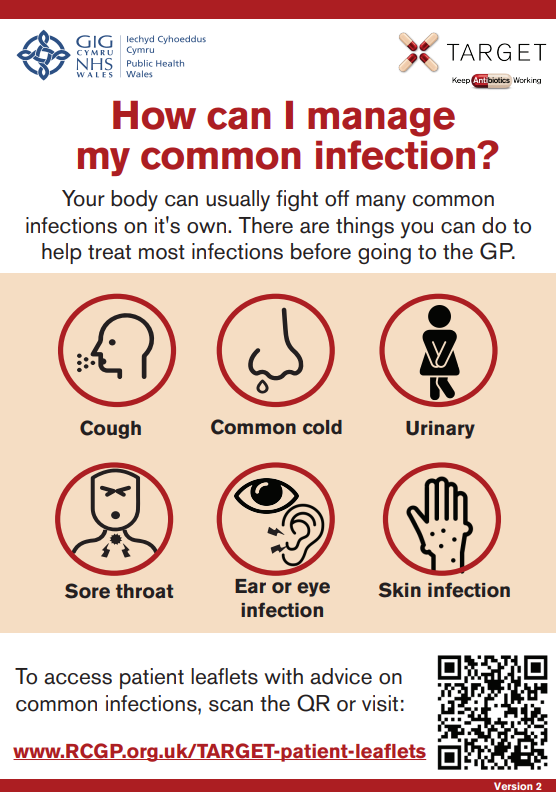
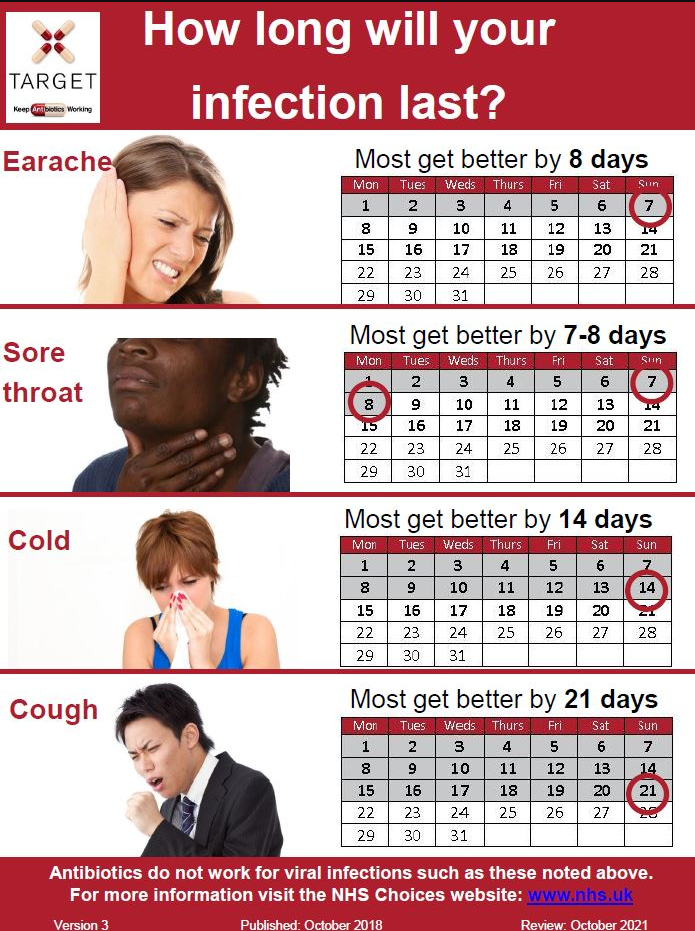
Published on 21st Aug 2025
Take control of you and your community’s health – use antibiotics wisely
Bacteria are becoming resistant to medicines at an increasing rate, turning once-treatable infections into potentially life-threatening conditions. This growing crisis - known as antimicrobial resistance (AMR) - is deepening health inequalities across our society:
• People in deprived areas face a 42% higher risk of developing antibiotic-resistant infections
• While 90% of antibiotic-resistant infections occur in white ethnic groups, Asian and Asian British communities experience the highest proportion of antibiotic resistant infections (nearly 40% of infections)
• Our declining ability to treat and prevent infections is having an increasing impact, particularly on our poorest communities, who are already more likely to face barriers in accessing healthcare.
Why is this happening? While bacteria naturally develop resistance over time, the misuse and overuse of antibiotics is speeding up this process, putting our most vulnerable communities at risk.
Take action to protect you and your community:
• Remember: Antibiotics are ineffective against colds and flu. Your body can fight these infections on their own.
• Only use antibiotics when prescribed by a healthcare professional
• Always complete the full course as directed by your healthcare professional
• Never save antibiotics for later, or share them with anyone else.
Q&A's
What is antimicrobial resistance (AMR)?
Antimicrobials, including antibiotics, are used to prevent and treat infections in humans, animals, and plants. However, the more we use these medicines excessively or inappropriately, the more the bugs they target evolve to survive and the antimicrobials stop working. This is known as AMR. Examples of misuse include taking antibiotics for viral infections, such as colds, sore throats, or coughs, which cannot be treated by antibiotics.
Who does AMR affect?
AMR can impact anyone. It threatens our ability to treat common infections and to perform life-saving procedures. Without effective modern antibiotics and other antimicrobial treatments, patients facing health issues, such as cancer treatment, colorectal surgery, hip replacements, caesarean sections or those harmed in war zones, will be more likely to die from infections.
How serious is AMR?
Every day, antibiotic resistance means we struggle to treat patients.
Antibiotic resistance means that bacteria are less likely to respond to first line treatments, which can lead to serious complications, including bloodstream infections, sepsis and hospitalisation. People who get a bacterial infection that is resistant to one or more antibiotics are more likely to die within 30 days compared to those who have an antibiotic sensitive infection.
Antimicrobial resistance is not a crisis of the future, but one that is with us right now.
What can I do to reduce AMR?
Always follow your doctor, nurse or pharmacist’s advice as to whether you need antibiotics. If they are prescribed, take them as directed, and never share them with friends and family or save antibiotics for later use.
You can also reduce the risks of AMR by reducing infections in the first place - take up the vaccinations you are eligible for and practice good hygiene like hand washing.
How are UKHSA and partners tackling AMR?
Alongside partners, we have made important progress in recent years. We have developed cutting-edge surveillance, techniques and modelling to inform interventions, with ongoing research to improve prescribing practices. We are also continually testing different therapeutic approaches to treat multidrug resistant organisms.
Everyone can help us in this fight by only taking antibiotics if you have been told to do so by a healthcare professional. Do not save some for later or share them with friends and family. Treat antibiotics with respect and they will be there to help us all in the future.
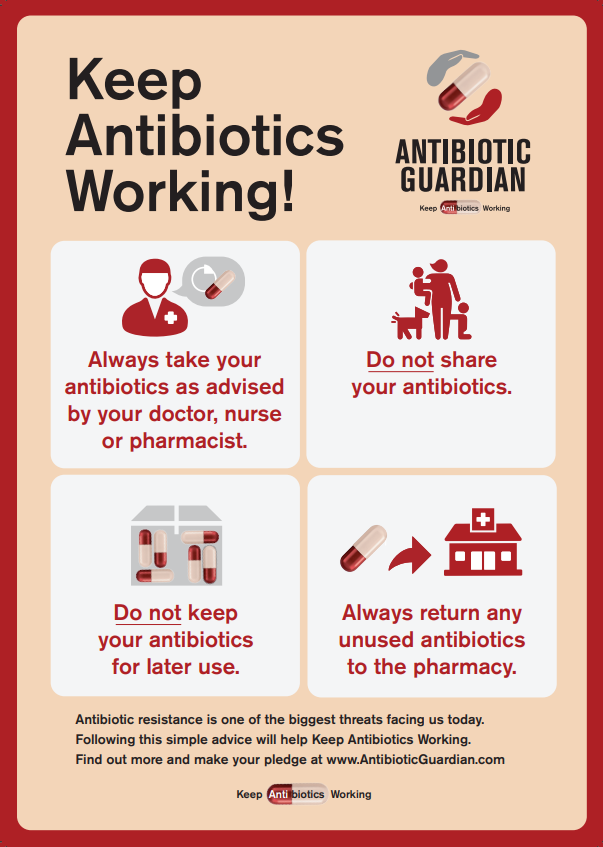
Published on 20th Aug 2025
Page created: 20 August 2025